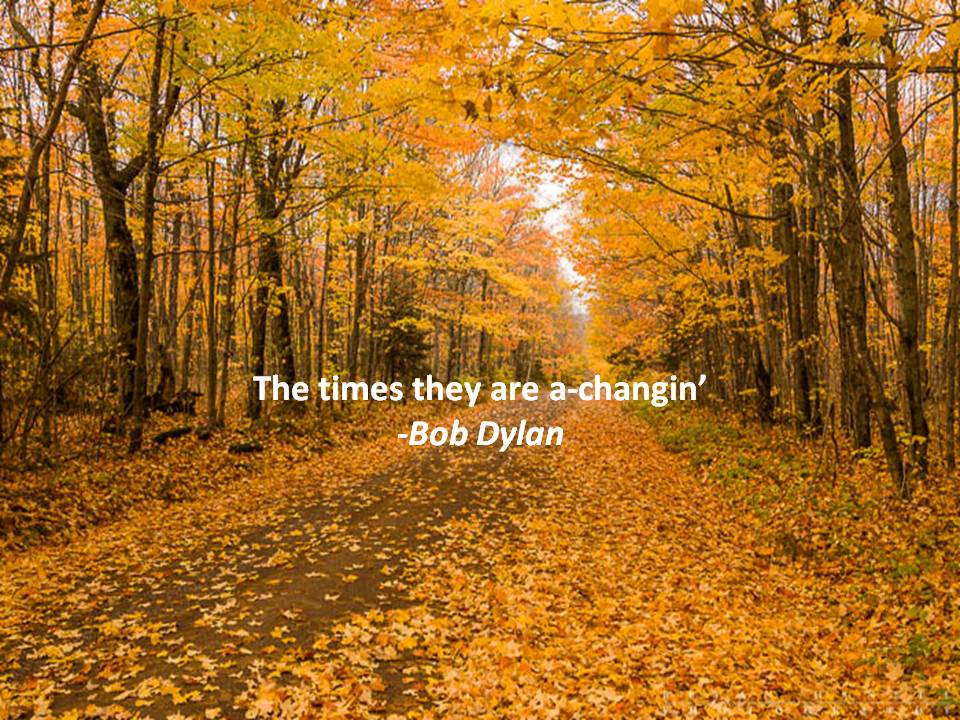By Tom Davis, CRNA, Lt. Col (ret)
Follow @procrnatom on twitter
“The slow one now will later be fast,
As the present now will later be past.
The order is rapidly fading, and the first one now will later be last,
For the times they are a-changin’.” Bob Dylan
Yes, The times, They Are A-changing
 The gremlins are gone, the spectacular fall color has been raked and as we search for the perfect gobbler, sleigh bells are ringing overhead. Just as sure as the seasons change, the face of the American workforce is changing.
The gremlins are gone, the spectacular fall color has been raked and as we search for the perfect gobbler, sleigh bells are ringing overhead. Just as sure as the seasons change, the face of the American workforce is changing.
While the baby boomers peruse their retirement bucket lists, the much-maligned millennial kids are setting up their work space. As a group, the millennial generation carries several negative stereotypes that makes hiring managers raise their eyebrows in doubt?. Millennials are represented as entitled, spoiled, impatient, lazy and a host of other negatives that, if true, would render them unfit for employment. Yet those born between 1977 and 1992 are rapidly entering the job market, including healthcare, and productivity is soaring. How can that be? There is a disconnect between the stereotype and the reality.
Consider a few of the elements that are desired in an ideal workplace regardless of the age or background of the worker.
- Sense of belonging
- Making a difference
- Professional development
- Culture of creativity/thinking environment
- Civility/diversity/mutual respect
- Recognition/reward
Whereas baby boomers entered an authoritarian, top down workplace and spent their careers working to create the ideal workplace, millennials have entered the workforce with the expectation that the elements their elders sought for decades are already in place. It’s not that millennials don’t want to work. It’s simply that if you don’t have a supportive environment, they don’t want to work for you, and they are fearless about looking elsewhere. The most effective leaders know the value of creating a highly desirable workplace, one that retains experienced workers while attracting the best and brightest of the younger generation.
In my experiences as a Nurse Anesthesia leader, I have hired many young healthcare professionals. Without exception, they have infused knowledge, talent and energy into the workgroup and quickly transitioned to become valued members of the team. Here are some excellent reasons to actively seek and hire young adult professionals.
- They are highly educated. Baby boomers entered the job market with hospital based diplomas whereas millennials are required to have post graduate degrees for entry level certification. They have mastered a body of knowledge that did not exist when their supervisors were in training.
- They are determined. Far from being lazy, the younger set believe that they can change things for the better and aren’t afraid to try. Computers have taught them that it is easy to delete and start over so they aren’t afraid to make mistakes. State the goal and provide the resources, then stand back and watch young people as they develop a creative solution.
- They are diverse. Baby boomers have survived decades of diversity training in the workplace whereas millennials don’t know anything but diversity. To them diversity is not an issue; it is a way of life. In addition to cultural diversity, millennials welcome diversity of thought and value the opinions of other.
- They are skilled with technology. As healthcare continues to transition from paper to digital, the young set is best prepared to lead the way. Baby boomers were raised with land line phones and learned to use computers as adults. Millennials were born into a computerized world. They view stories of the pre-computer world as ancient history and they will be attracted to jobs that encourage them to use their computer based creativity. To a millennial, an ideal workplace isn’t just tied to technology. To a millennial, work and technology are synonymous.
Just as the seasons change, so does the workforce that we depend upon to provide quality healthcare to a population with ever increasing needs. An ideal workplace has a mix of youth and seasoned workers who value one another and collaborate to blend knowledge and experience. By capitalizing on the strengths and optimism of the millennials while striving to develop an ideal workplace regardless of the generation of the worker, leaders will find a magic formula for ongoing success. Call it Millennial Magic!
